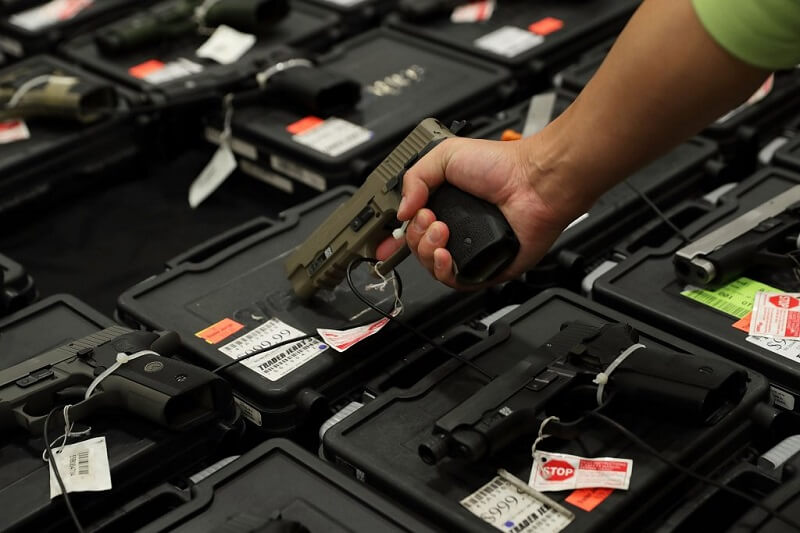Federal appeals court finds Maryland handgun qualification law unconstitutional

A federal appeals court has ruled that Maryland’s handgun qualification law is unconstitutional.
The decision by a three-judge panel of the Fourth Circuit Court of Appeals is the latest decision in a case that began in 2016.
“Maryland’s handgun qualification law is … the most severe of anywhere in the country by far,” said Mark Pennak, president of Maryland Shall Issue. “It is the most burdensome of any enacted anywhere.”
Maryland Shall Issue is one of the plaintiffs in the seven-year old case.
In its decision, a split three-judge panel ruled that the law unduly burdens Second Amendment rights. Additionally, the judges wrote that Maryland failed to show a “historical tradition” of firearm regulation justifying the license.
“If you live in Maryland and want a handgun, you must follow a long and winding path to get one,” the majority wrote in its published opinion, which establishes binding precedent for other cases.
Maryland has 14 days to seek a rehearing before the full Fourth Circuit Court of Appeals. It has 90-days to seek a review before the U.S. Supreme Court.
If the state opts not to seek a rehearing, the appellate court would issue a mandate to the lower court within seven days. Based on the timeline, the state may stop enforcing the license requirements in mid-December.
A spokesperson for the Office of the Attorney General did not immediately respond to a request for comment.
Gov. Wes Moore (D), in a statement, expressed disappointment in the decision.
“This law is not about stripping away rights from responsible gun owners – it’s about every Marylander having the right to live free from fear,” Moore said.
“Common-sense gun laws are critical to protecting all Marylanders from the gun violence that has terrorized our communities. I am determined to do more than just give thoughts and prayers and attend funerals – and that’s why this law is vital to our administration’s commitment to keeping guns out of the wrong hands and saving lives,” his statement continued.
The governor said his office is “currently looking at all options and reviewing the ruling.”
Passed in 2013, Maryland’s Handgun Qualification Law requires a person who wishes to buy a handgun to apply for the license.
To qualify, a person must be a state resident and at least 21-years-old. Additionally, the applicant must submit fingerprints, undergo a background check, and successfully complete a four-hour course that includes firing at least one live round at a firing range. The wait for a license can be 30 days, according to the court.
“In order to get a handgun, Plaintiffs still have to follow all of the law’s steps,” the majority wrote. “And, although they will be able to complete each one, it is impossible to do so right away. Plaintiffs can’t receive a license to legally acquire a handgun until the state reviews their applications, which can take up to 30 days. So, no matter what plaintiffs do, there will be a period of up to 30 days where their ability to get a handgun is completely out of their control. In other words, though it does not permanently bar plaintiffs from owning handguns, the challenged law deprives them of that ability until their application is approved, no matter what they do.”
Pennak said costs for classes, which fill quickly, as well as those for fingerprinting and background checks can easily reach $200 or more. Baltimore City residents have to travel to other jurisdictions to meet the firing range requirement. In rural areas, residents may have to travel to find an authorized fingerprinting business.
“It was designed to be an obstacle to keep people from exercising their constitutional rights,” Pennak said.
Additionally, the majority concluded that the state failed to justify the law based on the state’s historical regulation of firearms.
In its arguments, the state pointed to colonial era laws regarding training of militia and to current state and federal laws meant to keep firearms from “dangerous people.”
“But the two historical examples that Maryland cites are not ‘relevantly similar’ to the challenged law,” the majority wrote. “And it has offered no other historical evidence to justify its law. Indeed, Maryland admitted at oral argument that it had not presented a proper historical analogue for the challenged law, noting that it had identified no founding-era laws that ‘required advance permission’ before a citizen could purchase a firearm.”
Proving a historical analogue is a key component of the June 2022 U.S. Supreme Court case New York State Rifle and Pistol Association v. Bruen. That decision marks a turning point in how government regulates firearms in the United States and spelled the end of Maryland’s concealed carry law.
In September, Second Amendment advocates won another Bruen-related victory when a U.S. District Court blocked provisions in the Gun Safety Act of 2023. The judge struck down provisions designating businesses that sell alcohol as sensitive places where firearms could not be carried, and by prohibiting guns in all private buildings unless the owner gave specific consent to allow them.
Pennak said the state “always had an uphill battle” when it came to defending the law.
In her dissent, Senior Circuit Court of Appeals Judge Barbara Keenan wrote that the majority had overstepped the Supreme Court’s 2022 ruling.
“The majority bases its holding on the premise that if a law affects a prospective handgun purchaser’s ability to obtain a handgun ‘now,’ the law is presumptively unconstitutional,” wrote Keenan. “This sweeping rule flies directly in the face of Bruen’s discussion of non-discretionary ‘shall-issue’ laws and is not supported by any Supreme Court precedent. Simply stated, the majority’s hyperaggressive view of the Second Amendment would render presumptively unconstitutional most non-discretionary laws in this country requiring a permit to purchase a handgun (permitting laws).”




 Creative Commons Attribution
Creative Commons Attribution